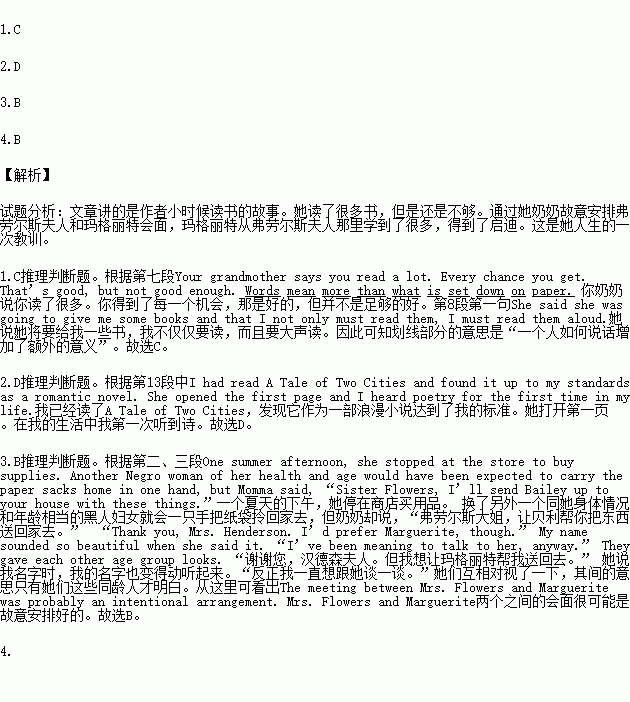题目内容
Mrs. Bertha Flowers was the aristocrat of Black Stamps. She had the grace of control to appear warm in the coldest weather, and on the Arkansas summer days it seemed she had a private breeze which swirled around, cooling her.
One summer afternoon, she stopped at the store to buy supplies. Another Negro woman of her health and age would have been expected to carry the paper sacks home in one hand, but Momma said, “Sister Flowers, I’ll send Bailey up to your house with these things.”
“Thank you, Mrs. Henderson. I’d prefer Marguerite, though.” My name sounded so beautiful when she said it. “I’ve been meaning to talk to her, anyway.” They gave each other age group looks.
There was a little path beside the rocky road, and Mrs. Flowers walked in front swinging her arms and picking her way over the stones.
Without turning her head, she spoke to me, “I hear you’re working very good school work, Marguerite, but that it’s all written. The teachers report that they have trouble getting you to talk in class.” We passed the triangular farm on our left and the path widened to allow us to walk together.
“Now no one is going to make you talk—possibly no one can. But bear in mind, language is man’s way of communicating with his fellow man and it is language alone which separates him from the lower animals.” That was a totally new idea to me, and I would need time to think about it.
“Your grandmother says you read a lot. Every chance you get. That’s good, but not good enough. Words mean more than what is set down on paper.”
She said she was going to give me some books and that I not only must read them, I must read them aloud. She suggested that I try to make a sentence sound in as many different ways as possible.
“I’ll accept no excuse if you return a book to me that has been badly handled.” My imagination boggled(退缩) at the punishment I would deserve if in fact I did abuse a book of Mrs. Flowers’.
The odors in the house surprised me. The sweet scent of vanilla(香草) had met us as she opened the door.
“Have a seat, Marguerite. You see, I had planned to invite you for cookies and lemonade so we could have this little chat.” She carried a plate covered with a tea towel.
As I ate she began the first of what we later called “My lesson in living.” She said that I must always be intolerant of ignorance but understanding of illiteracy. That some people, unable to go to school, were more educated and even more intelligent than college professors. She encouraged me to listen carefully to what country people called mother wit. That in those homely sayings was couched the collective wisdom of generations.
When I finished the cookies she brought a thick, small book from the bookcase. I had read A Tale of Two Cities and found it up to my standards as a romantic novel. She opened the first page and I heard poetry for the first time in my life.
“It was the best of times and worst of times...”
Her voice slid in and curved down through and over the words. She was nearly singing. I wanted to look at the pages. Were they the same that I had read? Or were there notes, music, lined on the pages? Her sounds began cascading(瀑布般落下) gently. I knew that she was nearing the end of her reading.
“How do you like that?”
It occurred to me that she expected a response. The sweet vanilla flavor was still on my tongue and her reading was a magic to my ears. I had to speak.
I said, “Yes, ma’am.” It was the least I could do, but it was the most also.
“There’s one more thing. Take this book of poems and memorize one for me. Next time you pay me a visit, I want to recite.”
I have often tried hard to search for the enchantment(着迷) I so easily found in those gifts. To be allowed, no, invited, into the private lives of strangers, to share their joys and fears, was a chance to exchange the Southern bitter wormwood(苦艾) for a cup of mead(蜂蜜酒) with Beowulf or a hot cup of tea and milk with Oliver Twist. When I said aloud, “It is a far, far better thing than anything I have ever done...” tears of love filled my eyes at my selflessness.
I was liked, and what a difference it made, I was respected not as Mr Henderson’s grandchild or Bailey’s sister but for just being Marguerite Johnson.
1.What does Mrs. Flowers mean by saying “Words mean more than what is set down on paper” (paragraph 7)?
A. Besides reading, Marguerite should talk more.
B. The content of books may have different meanings.
C. How one speaks adds extra meaning to words.
D. It is language that distinguishes humans from animals.
2. Marguerite’s opinion of A Tale of Two Cities before and after Mrs. Flowers’ reading can be described as _______.
A. poetic … musical B. satisfactory … informative
C. romantic … dramatic D. common … extraordinary
3.It can be inferred from the passage that _______.
A. Mrs. Flowers was born in a noble family.
B. The meeting between Mrs. Flowers and Marguerite was probably an intentional arrangement.
C. Marguerite hadn’t read poetry before her visit to Mrs. Flowers’ home.
D. Mrs. Flowers would recite new poems on Marguerite’s later visits.
4.Which can be the best title for the passage?
A. The Power of Language
B. A Lesson in Living
C. A Respectable Lady
D. My Initial Access to Charles Dickens
 期末冲刺100分创新金卷完全试卷系列答案
期末冲刺100分创新金卷完全试卷系列答案
